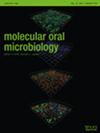针对树突状细胞的裂解粘附素 DNA 疫苗,可预防牙龈卟啉单胞菌诱发的牙周病
IF 2.9
3区 医学
Q1 DENTISTRY, ORAL SURGERY & MEDICINE
引用次数: 0
摘要
背景Arg-gingipain A(RgpA)是牙龈卟啉单胞菌(Porphyromonas gingivalis)的主要毒力因子,含有血凝素粘附素(HA),可帮助细菌粘附到细胞和蛋白质上。血凝素的功能域包括裂解粘附素(CA),它具有血凝和血红蛋白结合作用。在此,我们证实了 HA 和 CA 基因具有免疫原性,而且使用佐剂趋化因子靶向树突状细胞(DCs)可增强对牙龈脓胞诱发的牙周病的保护性自身免疫。方法 在牙龈炎诱导的牙周炎发生前,每两周用pVAX1-CA、pVAX1-HA、pVAX1和磷酸盐缓冲盐水(PBS)对C57小鼠进行预防性免疫,共注射三次。在转染 CA 慢病毒后,使用流式细胞术和核糖核酸测序(RNA-seq)转录组学检测对 DCs 进行了分析。结果与 pVAX1 组和 PBS 组相比,免疫后 pVAX1-CA 组和 pVAX1-HA 组的牙龈脓肿特异性 IgG 和 IgG1 均显著升高,牙周炎患牙周围的骨质流失也有所减少(p < 0.05)。CA的表达促进了DC中HLA、CD86、CD83和DC特异性细胞间粘附分子-3-抓取非整合素(DC-SIGN)的分泌。此外,RNA-seq 分析显示,趋化因子(C-C 矩阵)配体 19 的含量显著增加(p < 0.05)。在接受 CCL19-CA 免疫的小鼠腹股沟淋巴结中,观察到与 CD11c 和主要组织相容性复合体 II 类共标记的 DC 数量明显增加,同时干扰素-γ(IFN-γ)细胞也有所增加。结论联合注射 CCL19-CA DNA 疫苗有望成为针对牙龈脓毒性牙周炎和种植体周围炎的创新性、有针对性的免疫策略。本文章由计算机程序翻译,如有差异,请以英文原文为准。
A cleaved adhesin DNA vaccine targeting dendritic cell against Porphyromonas gingivalis–induced periodontal disease
BackgroundArg‐gingipain A (RgpA) is the primary virulence factor of Porphyromonas gingivalis and contains hemagglutinin adhesin (HA), which helps bacteria adhere to cells and proteins. Hemagglutinin's functional domains include cleaved adhesin (CA), which acts as a hemagglutination and hemoglobin‐binding actor. Here, we confirmed that the HA and CA genes are immunogenic, and using adjuvant chemokine to target dendritic cells (DCs) enhanced protective autoimmunity against P. gingivalis –induced periodontal disease.MethodsC57 mice were immunized prophylactically with pVAX1‐CA, pVAX1‐HA, pVAX1, and phosphate‐buffered saline (PBS) through intramuscular injection every 2 weeks for a total of three administrations before P. gingivalis –induced periodontitis. The DCs were analyzed using flow cytometry and ribonucleic acid sequencing (RNA‐seq) transcriptomic assays following transfection with CA lentivirus. The efficacy of the co‐delivered molecular adjuvant CA DNA vaccine was evaluated in vivo using flow cytometry, immunofluorescence techniques, and micro‐computed tomography.ResultsAfter the immunization, both the pVAX1‐CA and pVAX1‐HA groups exhibited significantly elevated P. gingivalis –specific IgG and IgG1, as well as a reduction in bone loss around periodontitis‐affected teeth, compared to the pVAX1 and PBS groups (p < 0.05). The expression of CA promoted the secretion of HLA, CD86, CD83, and DC‐specific intercellular adhesion molecule‐3‐grabbing non‐integrin (DC‐SIGN) in DCs. Furthermore, the RNA‐seq analysis revealed a significant increase in the chemokine (C–C motif) ligand 19 (p < 0.05). A notable elevation in the quantities of DCs co‐labeled with CD11c and major histocompatibility complex class II, along with an increase in interferon‐gamma (IFN‐γ) cells, was observed in the inguinal lymph nodes of mice subjected to CCL19‐CA immunization. This outcome effectively illustrated the preservation of peri‐implant bone mass in rats afflicted with P. gingivalis –induced peri‐implantitis (p < 0.05).ConclusionsThe co‐administration of a CCL19‐conjugated CA DNA vaccine holds promise as an innovative and targeted immunization strategy against P. gingivalis –induced periodontitis and peri‐implantitis.
求助全文
通过发布文献求助,成功后即可免费获取论文全文。
去求助
来源期刊

Molecular Oral Microbiology
DENTISTRY, ORAL SURGERY & MEDICINE-MICROBIOLOGY
CiteScore
6.50
自引率
5.40%
发文量
46
审稿时长
>12 weeks
期刊介绍:
Molecular Oral Microbiology publishes high quality research papers and reviews on fundamental or applied molecular studies of microorganisms of the oral cavity and respiratory tract, host-microbe interactions, cellular microbiology, molecular ecology, and immunological studies of oral and respiratory tract infections.
Papers describing work in virology, or in immunology unrelated to microbial colonization or infection, will not be acceptable. Studies of the prevalence of organisms or of antimicrobials agents also are not within the scope of the journal.
The journal does not publish Short Communications or Letters to the Editor.
Molecular Oral Microbiology is published bimonthly.
 求助内容:
求助内容: 应助结果提醒方式:
应助结果提醒方式:


